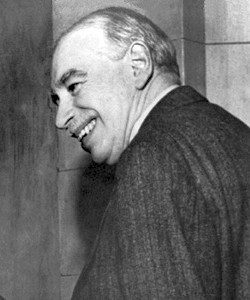Originally posted on Tuesday, July 16th, 2013
What were what Keynes called the “vague and jejune meditations” of Churchill’s advisors from the “imaginary academic world?”
 Courtesy of Wikipedia
Courtesy of Wikipedia
What persuaded Churchill to undertake the catastrophic blunder, in 1925, of resuming the gold standard at a dramatically overvalued pre-war parity? Doing so triggered a sharp recession, a million unemployed, the General Strike of 1926, and almost ended Churchill’s political career.Keynes, in ““The Economic Consequences of Mr. Churchill”:
What they ought to have said, but did not say, can be expressed as follows:—
“To begin with, there will be great depression in the export industries. This in itself will be helpful, since it will produce an atmosphere favourable to the reduction of wages. The cost of living will fall somewhat. This will be helpful too, because it will give you a good argument in favour of reducing wages. Nevertheless, the cost of living will not fall sufficiently, and, consequently, the export industries will not be able to reduce their prices sufficiently until wages have fallen in the sheltered industries. Now wages will not fall in the sheltered industries merely because there is unemployment in the unsheltered industries, therefore you will have to see to it that there is unemployment in the sheltered industries also. The way to do this will be by credit restriction. By means of the restriction of credit by the Bank of England you can deliberately intensify unemployment to any required degree until wages do fall. When the process is complete the cost of living will have fallen too, and we shall then be, with luck, just where we were before we started.
“We ought to warn you, though perhaps this is going a little outside our proper sphere, that it will not be safe politically to admit that you are intensifying unemployment deliberately in order to reduce wages. Thus you will have to ascribe what is happening to every conceivable cause except the true one. We estimate that about two years may elapse before it will be safe for you to utter in public one single word of truth. By that time you will either be out of office or the adjustment, somehow or other, will have been carried through.”
Although the great French economist Jacques Rueff emphatically (and to his own regret posthumously, in a 1947 article in the Quarterly Journal of Economics) disputed Keynes General Theory, Rueff too sensitively was attuned to the humanitarian problems risked by the overvaluation of gold. Rueff applauded FDR for revaluing in line with general commodities prices — thereby immediately (if temporarily, due to an ensuing policy error by the US Treasury) — from $20.67 to $35 under the guidance of agricultural economist George Warren.And proponents of restoring a modern, 21stcentury, gold standard such as Reagan Gold Commissioner Lewis E. Lehrman, founder and chairman of the Lehrman Institute, propound a mechanism to define the rebooting of the definition of the dollar in a manner meticulously designed not to replicate Churchill’s blunder but rather to generate a climate of equitable prosperity for American working families.

Recent Comments